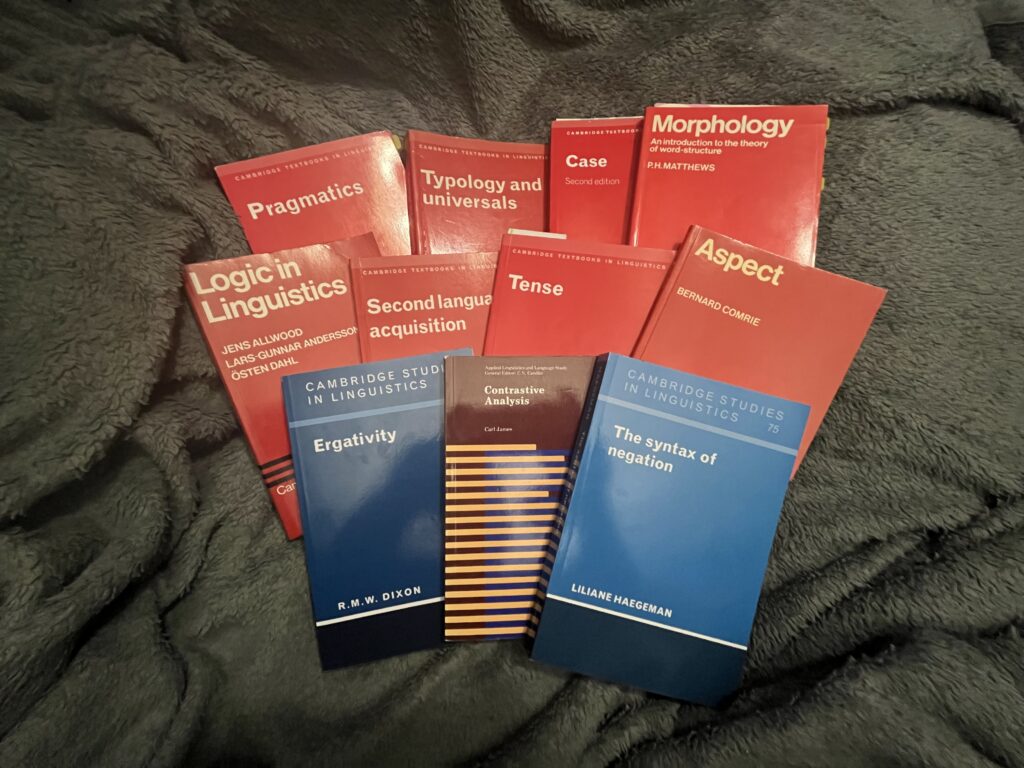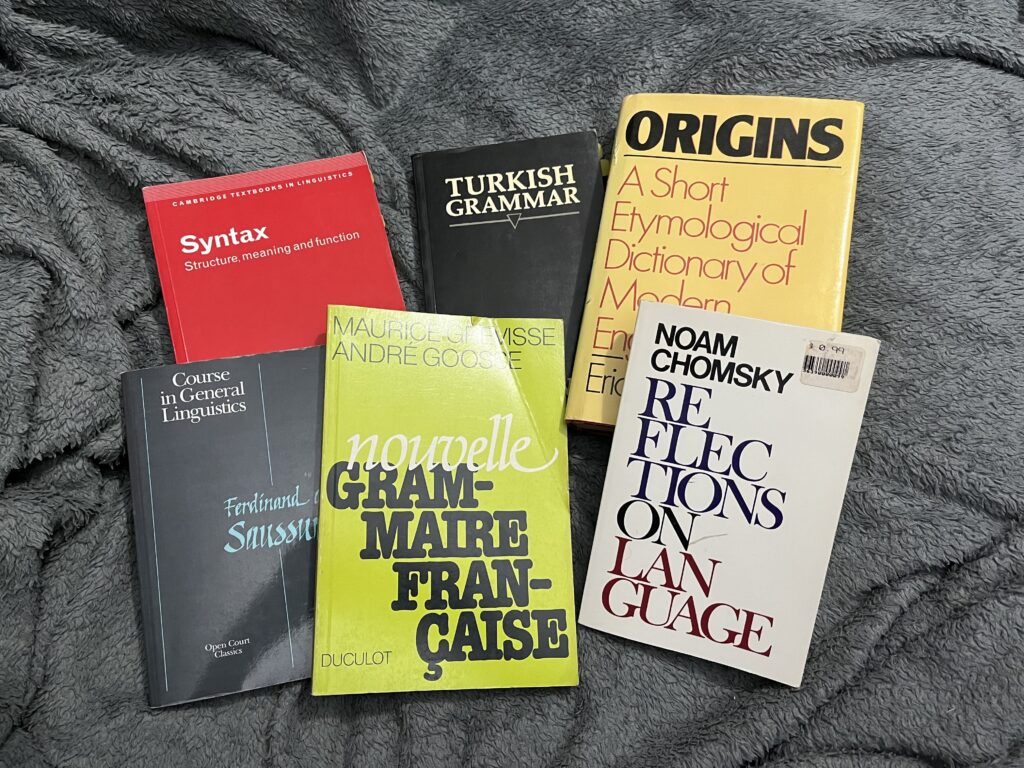Linguistics Reading
I’ve made it my mission to gather up as many linguistics books as I can realistically afford and that will serve me well. I’ve gravitated toward the series of linguistics textbooks published by Cambridge University Press, which are plentiful in the secondhand market due to their widespread use in American and European linguistics programs.
Understanding linguistics serves the purpose of making me better at conlanging, but more importantly, it will open up the world of linguistics to my understanding, which will have ripple effects throughout my life (making me better at my job as a professional word-slinger, equipping me to understand argment and rhetoric better, so on and so forth). Plus, linguistics is inherently interesting to me as a subject, and reading about it doesn’t feel terribly much like work.
Let’s look at some of my recent acquisitions.
I’ve managed to amass enough textbooks to serve, minus some acquisitions still in transit through the mail, as a decent undergraduate linguistics curriculum. There are still some topics I haven’t yet addressed with my book collection; I’d like to pick up Greville Corbett’s works on gender and number, Moira Yip’s text on tonality, and a smaller book on syntax (the one by Matthews seems promising).
Not pictured below are my laptop, my iPad, and the software and services I use to perform linguistic research and to do my reading.

Pictured above are:
- Pragmatics by Stephen C. Levinson
- Typology and Universals by William Croft
- Case by Barry Blake
- Morphology by P.H. Matthews
- Logic in Linguistics by Jens Allwood, Lars Gunnar Andersson, and Östen Dahl (translated from the Swedish by the authors)
- Second Language Acquisition by Wolfgang Klein
- Tense by Bernard Comrie
- Aspect by Bernard Comrie
- Ergativity by R.M.W. Dixon
- Contrastive Analysis by Carl James
- The Syntax of Negation by Liliane Haegeman

Pictured above are:
- Syntax: Structure, Meaning, and Function by Robert Van Valin and Randy LaPolla
- Turkish Grammar by G.L. Lewis
- Origins: A Short Etymological Dictionary of Modern English by Eric Partridge
- Course in General Linguistics, originally by Ferdinand de Saussure and his students, translated from the French by Roy Harris
- Nouvelle grammaire française by Maurice Grevisse and André Goosse (in French)
- Reflections on Language by Noam Chomsky
Currently in transit are Mood and Modality by F.R.W. Palmer and Phonology by Roger Lass. Not pictured are grammars of Arabic, Indonesian, and Mandarin Chinese. I like to peruse grammars of languages I don’t speak and mine them for inspiration. I’m not making much use of that approach for Keregafa, but I am using it in another project I’m working on called Uwrona (details later this year). The grammar of French is as much for my own personal reference (French being my second language) as it is for conlanging inspiration, and the grammar of Chinese is also for my own consumption (since I’ve started studying Chinese again).
I’m also looking for a good text on semantics and as I said above, Gender and Number by Greville Corbett. Works on language acquisition and other areas of psycholinguistics, and on dialectology and other areas of sociolinguistics, are on my radar but are very low priorities right now. When it comes to reviewing literature, I’m still very new to the practice (I used to read academic papers in computer science, so it’s not entirely new to me — but linguistics is a new field), but I find my papers on Academia.edu and sometimes just by plain Google search. Some researchers retain the rights to their works and publish their papers on their websites – Bohnemeyer’s “Temporal anaphora in a tenseless language,” which explains the way that languages without tense express relationships of events in time, is an example available directly from the author’s page at the University of Buffalo website. Some good places to find sources include:
- YouTube videos on linguistics and conlanging by Artifexian, Biblaridion, and NativLang often include sources in their descriptions or in a linked Google Document. NativLang is run by an actual linguistics graduate, while the presences behind Artifexian and Biblaridion are enthusiastic amateurs who’ve done a lot of reading. An underrated channel I’d highly recommend in the conlanging space is Lichen the Fictioneer, who has some interesting videos about polysynthesis (the two-part “Polysynthesis for Novices” is a must-watch, and it has me wanting to learn Ainu), ergativity, and the broader art of conlanging.
- Wikipedia pages on linguistis invariably include lists of the sources cited to write the article. In the days when dinosaurs still roamed the earth and a library’s card catalog was still a literal catalog of cards, laypeople often started their research ventures by using the encyclopedia in just that way: by figuring out what sources the encyclopedists used and citing those sources themselves. The quality on Wikipedia is wildly variable to put it lightly, though the more technical articles about subjects like math, linguistics, medicine, and computer science (the four “technical subjects” I know the best) are usually quite good.
- Any linguistics topic is just a Google search away. “Swedish phonotactics,” “ergativity in Hindi,” “noun incorporation,” and “tone sandhi in Mandarin” are four examples of topics that produced more results than I could easily go through in an afternoon. These searches can turn up all sorts of things, from lecture notes to research papers and from non-technical introductions to detailed analyses.
The major academic journals are paywalled, and quite heavily so at that. As a non-practitioner, the value of a subscription to an academic journal just isn’t there for me. A subscription to Lingua1To linguistics what The Lancet is to medicine or Nature is to biology., for example, is US$340 per year. Selected articles from the major journals are open-access; if their authors so choose, these are available under Creative Commons licenses that allow the works to be freely shared. I’ve already downloaded a few articles this way and added them to my reading list. The quality of academic papers on Academia.edu is wildly variable – I have seen papers that wouldn’t have gotten past a hawk-eyed fellow researcher, much less peer review, in the West that were presented as journal articles in some countries, but I’ve also seen top-notch research there – and the amount of content is vast and to put it candidly, overwhelming at times. There are slide decks from academic conferences, uploads of whole-ass books, lecture notes and other course content, and pre-press papers from academics of all levels of notoriety.
Regarding books, many booksellers on eBay have cheaper books than what you can find on Amazon. You might think that I would be able to find linguistics books fairly easily here since Knoxville is a college town, but this supposition ignores two essential observations:
- Linguistics is a niche within a niche, and it’s not a program for which the University of Tennessee is well known.
- The university bookstore sells textbooks to the general public, but its books are hideously overpriced. Even so, its selection of linguistics books wasn’t great in the late 2000s when I was in college, and I have no reason to think it’s any better now.
My linguistics journey is only beginning. I have much left to learn, many conclusions still to draw, many deductions still to deduce, and many observations still to make. This is a rich, fascinating field with considerable crossover into other fields of endeavor, and I can’t wait to be along for the ride.